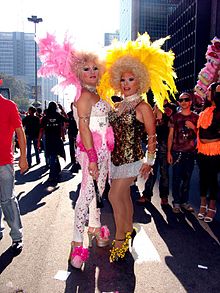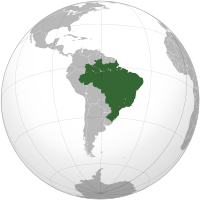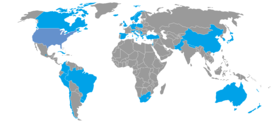- Changing legal gender assignment in Brazil
-
 Transvestites in São Paulo
Transvestites in São Paulo
Changing legal gender assignment in Brazil is legal according to the Superior Court of Justice of Brazil, as stated in a decision rendered on October 17, 2009.[1]
Unanimously, the 3rd Class of the Superior Court of Justice approved allowing the option of name and gender change on the birth certificate of a transsexual who has undergone gender reassignment surgery.
The understanding of the ministers was that it made no sense to allow people to have such surgery performed in the free federal health system, Sistema Único de Saúde, and not allow them to change their name and gender in the civil registry.[2]
The ministers followed the vote of the rapporteur, Nancy Andrighi. "If Brazil consents to the possibility of surgery, it should also provide the means for the individual to have a decent life in society," she said. In the opinion of the rapporteur, preventing the record change for a transsexual who has gone through a sex change could constitute a new form of social prejudice, and cause more psychological instability.[3]
"The issue is delicate. At the beginning of compulsory civil registry, distinction between the two sexes was determined according to the genitalia. Today there are other influential factors, and that identification can no longer be limited to the apparent sex. There is a set of social, psychological problems that must be considered. Vetoing this exchange would be putting the person in an untenable position, subject to anxieties, uncertainty, and more conflict," she said.[4]
According to Minister João Otávio Noronha of the Superior Court of Justice, the transsexual, in respect to their dignity, autonomy, intimacy and privacy, should have their social integration ensured according to their individual identity, which must therefore incorporate their civil registry.[5]
In 2008, Brazil's public health system started providing free sex change operations in compliance with a court order. Federal prosecutors had argued that sexual reassignment surgery was covered under a constitutional clause guaranteeing medical care as a basic right.[6]
The Regional Federal Court agreed, saying in its ruling that "from the biomedical perspective, transsexuality can be described as a sexual identity disturbance where individuals need to change their sexual designation or face serious consequences in their lives, including intense suffering, mutilation and suicide."
Patients must be at least 21 years old and diagnosed as transsexuals with no other personality disorders, and must undergo psychological evaluation with a multidiciplinary team for at least two years.[7]
See also
- LGBT rights in the Americas
- LGBT rights in Brazil
- Legal aspects of transsexualism
- Name change
- List of transgender-related topics
- Changing legal gender assignment in Canada
- Changing legal gender assignment in the United States
References
- ^ Transgenders can change their name, as decided by the Supreme Court of Justice (Portuguese)
- ^ Gender reassignment surgery is free in Brazil (Portuguese)
- ^ Jurisprudence of the Changing legal gender assignment in Brazil by Superior Court (Portuguese)
- ^ The Superior Court of Justice allows transsexuals to change name and sex on birth certificate (Portuguese)
- ^ Legal change of name in Brazil (Portuguese)
- ^ Sex-change in Brazil (Portuguese)
- ^ Brazil to provide free sex-change operations (English)
Lesbian, gay, bisexual, transgender topics in Brazil LGBT law LGBT rights in Brazil · Recognition of same-sex unions in Brazil (ADI 4277 and ADPF 132) · Same-sex adoption in Brazil · Same-sex immigration policy in Brazil · Changing legal gender assignment in Brazil · Anti-discrimination laws in Brazil · Legal status of homosexuality in Brazil · Sexual orientation and the Brazilian military · Age of consent in Brazil
LGBT life LGBT history in Brazil · LGBT people in Brazil · LGBT tourism in BrazilLGBT groups Conselho Nacional de Combate à Discriminação (Brasília) · Grupo Gay da Bahia (Salvador) · Associação Brasileira de Gays, Lésbicas, Bissexuais, Travestis e Transexuais (Curitiba)LGBT streets Frei Caneca Street (São Paulo) · Farme de Amoedo Street (Rio de Janeiro)LGBT beaches LGBT events Salvador Hell & Heaven (Salvador) · São Paulo Gay Pride Parade (São Paulo) · Florianópolis Gay Carnival (Florianópolis) · Rio de Janeiro Gay New Year's Eve (Rio de Janeiro)Category:LGBT in Brazil  Brazil
BrazilHistory First inhabitants · Colonization · Empire · Old Republic · Vargas Era · Second Republic · Military rule · ContemporaryGeography Regions · States · Mesoregions · Microregions · Municipalities · Islands · Coastline · Climate · Environment · Extreme points · Protected areas · CapitalsGovernment Constitution · Federal government · President · National Congress · Foreign relations · Law · Law enforcement · MilitaryPolitics Economy Society Demographics · People · Languages · Religion · Immigration · Education · Health · Crime · Social issues · Largest cities · ApartheidCulture  Category ·
Category ·  Portal ·
Portal ·  WikiProject
WikiProjectLGBT rights in South America Sovereign states Dependencies and
other territories- Aruba
- Bonaire
- Curaçao
- Falkland Islands
- French Guiana
- South Georgia and the South Sandwich Islands
Categories:- Brazilian law
- LGBT rights in Brazil
- Transgender law
Wikimedia Foundation. 2010.

